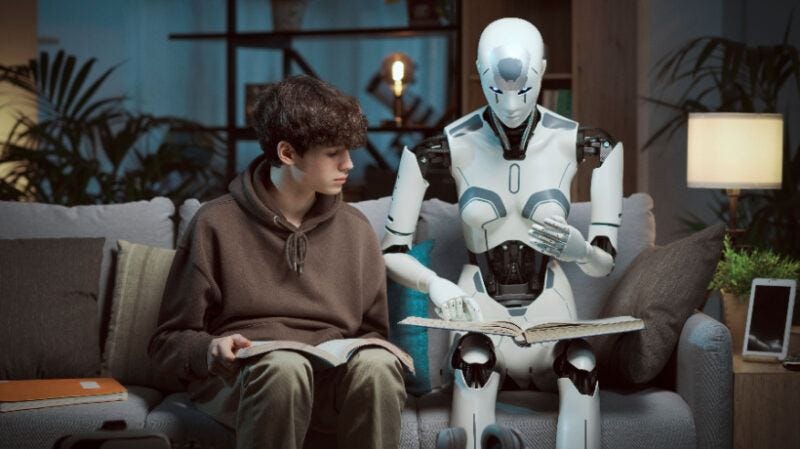The Conversations We’re Not Having About AI (But Desperately Should)
It's past time we discussed the world changing before our eyes.
Big changes are afoot in our world. Huge, really.
Brought to us, courtesy of AI.
And yet, we’re not having the conversations we need to as a people. This is a problem. A huge one, really.
As former Google CEO Eric Schmidt recently said, if anything, the AI Revolution is “underhyped”—not overhyped. We are “underestimating AI’s significance.”
A news story from last week brought this idea home to me in technicolor. Time reported the results of a stunning MIT study that reveals ChatGPT is harming our thinking abilities. In other words, it’s dumbing us down:
The study divided 54 subjects—18 to 39 year-olds from the Boston area—into three groups, and asked them to write several SAT essays using OpenAI’s ChatGPT, Google’s search engine, and nothing at all, respectively. Researchers used an EEG to record the writers’ brain activity across 32 regions, and found that of the three groups, ChatGPT users had the lowest brain engagement and “consistently underperformed at neural, linguistic, and behavioral levels.” Over the course of several months, ChatGPT users got lazier with each subsequent essay, often resorting to copy-and-paste by the end of the study.
But everyone is using AI in academia…
Pair this with a recent podcast I recorded featuring newly minted film school graduate Luca Csathy in which he told me “every college student is using AI.” He said even those students studying screenwriting are also using AI to write their scripts as a mental shortcut.
As a former screenwriting graduate and professor, that’s troubling. Because, as Luca said, “What’s being lost is the student’s own voice.” They’re not developing critical thinking nor learning how to articulate their ideas.
Instead? They’re outsourcing their brains to a machine. That process—wrestling with language, clarifying thoughts, building an argument—was always the point of higher education. If we skip it, what are we really learning?
Nothing, it turns out.
That’s not all. Professors are also leaning on AI as a mental shortcut. This reality calls into question our entire educational system. If even our gatekeepers cannot be counted on to hold the line against widespread cheating, can we really expect young people—whose decision-making neocortices will not fully form until age 25—to be academically honest?
You know that answer.
Now, let’s extrapolate out 20 years.
· What happens to society when young people do not learn facts or even how to write their own essays?
· What happens when AI destroys our youth’s already dwindling critical thinking skills?
· What happens when teens come of age to a job market that doesn’t need them anymore because AI—and then later robots with fine motor skills, operating with a ChatGPT brain—can perform human labor?
· What happens when young people stop dating or marrying—and instead form romantic bonds with AIs?
Will all these things happen? Maybe. I don’t know. But grownups should be discussing these possibilities.
We’re not.
This is why I created The AI Philosopher.
I started this channel because I saw a societal need going unfulfilled. Once upon a time, we enjoyed a monoculture. We watched movies and TV shows together. We read similar books and listened to similar music. This didn’t mean we agreed upon everything or shared the same political views. But it did mean we at least had a common ground from which to discuss ideas.
In 2025, that reality is long gone.
Each of us is a digital island, watching curated newsfeeds algorithmically tailored to our tastes and opinions. We’re fed content that only cements our viewpoints even further, cutting us off from our fellow humans—preventing the discourse necessary to deal with so much AI-wrought change.
What’s something else we’re not discussing?
We also aren’t talking about the implications of President Trump’s “Big, Beautiful Bill, a.k.a. The One Big Beautiful Bill Act. While the country is still reeling from the American bombing of Iran—and the specter of World War III—another danger lurks.
Buried deep in the bill is this chilling clause:
No state “may enforce any law or regulation regulating artificial intelligence models, artificial intelligence systems, or automated decision systems” for a 10‑year period, beginning on the date the bill is passed.
Wait. What?
America is on the precipice of embedding a 10-year moratorium on any state level AI regulation? States are freezing the ability to create and/or enforce any limits on AI at the risk of losing federal funding?
Do you remember hearing any mainstream discussion of this provision? Do you recall any politician—outside of Marjorie Taylor Greene—talking about this bill’s wider implications? No matter your personal feelings towards MTG, we must acknowledge her willingness to confront the existential danger that apparently no TV talk show host, celebrity, or political pundit is voicing.
The fact is, AI is a juggernaut the likes of which we have never seen. It promises to upend every facet of life in profound ways we can scarcely imagine. And all that disruption won’t happen in 50 or even 20 years.
It’s occurring in real time—at warp freakin’ speed.
No one can put the AI genie back in the bottle
That’s undeniable.
But what we can do is discuss these monumental shifts. It’s past time that we demand our elected leaders bring the public into conversations (we aren’t having.) It’s also necessary that parents talk to their kids with open, direct language about the most important development of their lifetimes.
For our children’s sake and generations to come, it’s our duty to face this reality head-on with thoughtfulness and care.
Let’s fulfill it, starting today.




